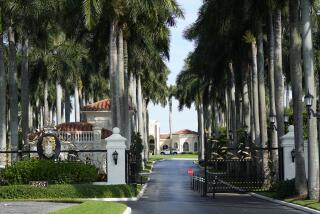Son’s Slaying Transforms Congressman’s Priorities
- Share via
CHICAGO — In the predawn hours of Dec. 4, 1969, police stormed an apartment on Chicago’s West Side, killing Black Panthers Fred Hampton and Mark Clark in a hail of bullets. Fellow Panther leader Bobby Rush, who had left only hours before, immediately went on the run; his family’s home became the cops’ target the next day.
But amid the tumult and tragedy, Rush had been given a source of hope, a new direction for his attentions: a son, Huey Rich, born just three weeks earlier.
His friends’ slaying was Rush’s first personal exposure to the havoc guns can wreak on lives and families. Now, some 30 years after that searing experience, Rush is newly devastated by gun violence, with the much-too-early end of that son’s life on the city’s mean streets.
He also is, as before, searching for some way to harness his anguish.
So Rush--who turned from a young beret-and-sunglasses militant with an upraised fist to a graying four-term congressman--has set his sights against guns, after once advocating that young blacks take them up in an armed struggle against white exploitation.
Just four days after Huey Rich’s funeral, Rush already was working with rededicated vigor against what he calls America’s “glorification of the gun” by trying to help stop Chicago’s grim tradition of shooting bullets into the air to celebrate New Year’s.
“I am tired of hearing the mothers,” he said in an emotional interview six weeks after his son’s shooting on Chicago’s South Side. “I won’t ever forget--my son’s mother, his sisters, his brothers, his stepmother, his fiancee--I won’t ever forget that screeching sound when the doctors informed us that Huey had passed.”
It’s not so much that his new mission is any real consolation-- nothing so easy can lessen a father’s grief. It’s more as if he just grabbed onto a new reason for being and can’t let go.
“What really is pushing me is my faith. I feel that God is propelling me in a certain direction. I don’t know why,” he said, choking back tears. “But I’m committed that my son’s death will not be in vain. I’ve got to do something.”
Huey Rich was born to Rush and Saundra Rich, who met through the Panthers movement but never married, and was reared by an aunt. Named after Black Panther founder Huey Newton, he always used his mother’s surname.
He went to a military academy and attended some college before working as a clerk and janitor for the Cook County Sheriff’s Department. He was sensitive and creative, handsome and charismatic, Rush said.
“He could disarm you,” Rush said. “He was a guy who could walk into a room and light it up.”
Rich’s friends agreed.
“He was just a very, very polite, kind person,” said Betty Clawson, who runs the Dudley Beauty College, where Rich was only a few hours’ training away from earning his cosmetology degree. Rich always liked to work up front, where he could greet people, and his fellow students draped his regular work station in black after he died.
His goal was to open “the baddest day spa in Chicago,” Clawson recalled.
Rush said it was Rich’s 3-year-old daughter who seemed to focus his son.
“He was beginning to show maturity, to set some goals,” Rush said.
On Oct. 18, Rich and his fiancee were returning to his apartment laden with groceries when two men approached him saying they were policemen. They were wearing bulletproof vests and carrying walkie-talkies and badges, but Rich didn’t believe them and ran. They shot him twice--in the groin and leg--and then robbed him of several hundred dollars while he lay bleeding, authorities say .
By the time Rich reached the hospital, he had all but bled to death.
Ten hours of surgery and a total blood transfusion couldn’t repair the damage to his organs, and they began to fail one by one. Four days later, Rich died.
One man, Leo Foster, has been charged with the murder; another is still being sought. In a statement to police, Foster admitted involvement in the killing. He also said Rich was targeted because they believed he was carrying cash or drugs for a dealer.
Chicago police spokesman Pat Camden would not comment on whether investigators believe this is true, and Foster’s attorney has disputed some parts of the statement. But whether Rich was caught up in a shady lifestyle or mistaken for someone else, as his family wants to believe, police do not think the shooting was random; his apartment was ransacked as well.
Rush’s pain, so raw still, is riddled with the regrets born of a complicated but close relationship with his son. His busy life took time away from all five of his children.
But he has an outlet available to few victims of urban violence. As a member of Congress, Rush has an instant platform from which to launch his campaign against the killing.
Fellow Chicago Democratic Rep. Jesse Jackson Jr., a longtime friend, recalled watching other members approach Rush on the House floor with heartfelt condolences--many who did not know him at all. Jackson hopes they’ll listen closely to a rare message--personal testimony about urban street violence from one of their own.
“It happens in many families in the country, but many families feel very powerless about it,” Jackson said. “It’s just by chance that Congressman Rush is in a position to channel that anxiety and mourning into something positive. . . . That’s very powerful.”
The turnaround from the Bobby Rush of the 1960s is astonishing.
A Boy Scout as a youth, Rush enlisted in the Army at 17. While stationed in Chicago, he joined the Student Non-Violent Coordinating Committee because of a commanding officer he viewed as racist.
By 1968, when the Rev. Martin Luther King Jr. was assassinated, Rush went AWOL and founded the Illinois Black Panthers. He became the chapter’s “defense minister”; the Army honorably discharged him.
He operated the Panthers’ Free Breakfast for Children program and its Free Medical Clinic, which conducted sickle cell anemia testing. But he also encouraged black men to be proficient with guns and spent six months in jail on weapons charges.
In the 1970s the Panther party was brought down by deaths, defections and infighting. Rush went his own way as well, proud of his involvement but convinced that changing times meant he could accomplish more by working within the establishment.
He went to college, sold life insurance and became involved in mainstream politics, rising to be deputy chairman of the state Democratic Party. He was elected to the Chicago City Council in 1983.
Rush, now 53, came to Capitol Hill seven years ago and quickly impressed House Democratic leaders, although the GOP’s 1994 takeover of the House halted his rise to power. His bid to return to Chicago as its mayor ended in crushing defeat in February, after Richard M. Daley won reelection in a landslide. He also faces a tough reelection race next year, with two state senators challenging him in the Democratic primary.
In Congress, he has spoken passionately against proposals he sees as harmful to the mostly inner-city, black and economically struggling constituents of his district. He’s been an active proponent of gun control, authoring three bills and signing on to 28 more.
Until now it’s been just one of many issues that interested Rush.
No more.
“Right now, because of Huey’s death and because of my own faith,” Rush says, “this is center to me.”
He would like to see a ban on all privately owned handguns and assault weapons and legislation toughening licensing requirements for gun dealers.
But he also realizes the limits to what legislation can accomplish in a society so numbed to violence, and acknowledges the difficulty of even passing new gun control laws in the current political climate.
Rush sees greater potential in another arena: Hollywood.
He’s grappling for a way to encourage movie and television producers to stop sanitizing death and violence in their shows and, if they have to portray it at all, to show what really happens when someone is shot--the fear and pain in the family members and the hopelessness left in the community after yet another young death. He also wants to communicate that message directly to young people.
His hope is that if he and other victims speak together, the rest of the country will be forced to listen and act.
Rush believes he has the right background--not just his Panther days and his years in Congress but also his recently acquired master’s in theology--to start this battle. And he does not--cannot--believe it is unwinnable.
“We’ve conquered so many diseases,” Rush said, his normally soft voice rising in anger. “Why can’t we conquer this disease of violence? We’ve got to create the national will and do it.”
More to Read
Get the L.A. Times Politics newsletter
Deeply reported insights into legislation, politics and policy from Sacramento, Washington and beyond. In your inbox twice per week.
You may occasionally receive promotional content from the Los Angeles Times.










